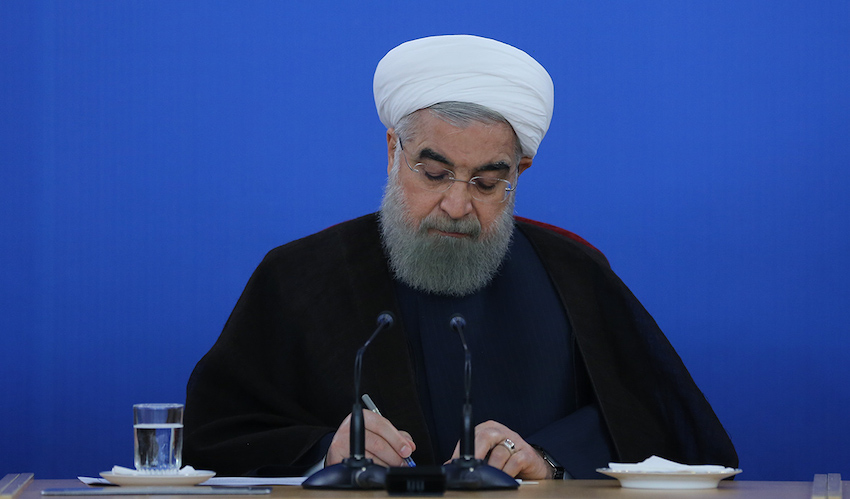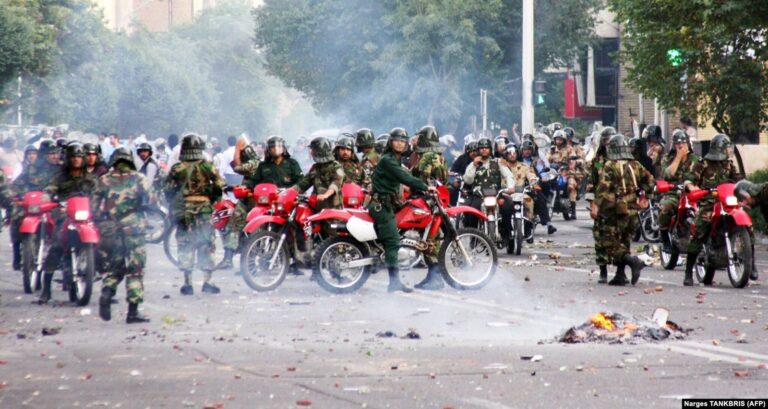
Iranian president Hassan Rouhani has signed into law two controversial amendments to the Penal Code, which it is feared will be used to further clamp down on unrecognised religious minorities, including Christian converts.
The amendments affect two articles of the Penal Code that are routinely used in the prosecution of converts: Articles 499 and 500.
Indeed, every one of the more than 20 Christians currently in prison on charges related to their peaceful religious activity were prosecuted under either or both Article 499 or 500, which relate respectively to membership or organisation of “anti-security groups”, and “propaganda” against the state or in support of opposition groups.
Of the two amendments, it is the amendment to Article 500 which will most concern advocates of freedom of religion in Iran – including the freedom to change one’s belief and to propagate it, as enshrined in Article 18 of the International Covenant of Civil and Political Rights, to which Iran is a signatory, without reservation, and therefore legally bound to uphold.
ARTICLE 19, an organisation dedicated to the protection of freedom of speech, called the changes to Article 500 “a full-on attack on the right to freedom of religion and belief”.
The amended version of Article 500 provides for up to five years’ imprisonment for “any deviant educational or proselytising activity” by members of so-called “sects” that “contradicts or interferes with the sacred law of Islam” through “mind-control methods and psychological indoctrination” or “making false claims or lying in religious and Islamic spheres, such as claiming divinity”.
Given that Iran’s judiciary, in its response to a UN letter of concern about alleged persecution of Christians, recently referred to imprisoned house-church members as belonging to “cults”, it is easy to see how the new provisions may be used to further clamp down on them.
The same is true of the amendment to Article 499, relating to membership or organisation of “anti-security groups”; in its response to the UN, the Iranian judiciary called house-churches “enemy groups” with “anti-security purposes”, while claiming “nobody is prosecuted on religious grounds”.
The new amendment to Article 499 provides for up to five years’ imprisonment for “anyone who insults Iranian ethnicities or divine religions or Islamic schools of thought recognised under the Constitution with the intent to cause violence or tensions in the society or with the knowledge that such [consequences] will follow”.
As ARTICLE 19 noted in its analysis, the vaguely-worded amendment “grant[s] extensive interpretive discretion to the prosecutorial and judicial authorities, providing a fertile ground for arbitrary arrest and detention” and will “further tighten the already shrunken space for freedom of expression in the country”.
In both cases, the punishment can be doubled to up to 10 years’ imprisonment if the groups in question have received either financial or organisational help from outside the country.
Background
The amendments were first proposed in Iran’s parliament in May last year, but were twice rejected by the Guardian Council, which must approve all bills.
In July, the council sought eight clarifications, the majority of which related to overly “ambiguous” language. Then, in November, it returned a second version to the parliament for further changes.
But throughout the process, it seemed a question of when, not if, the bill would pass into law.
The main changes to the originally proposed bill are to Article 499.
The original version imposed punishments on “anyone who insults Iranian ethnicities with the intent to cause discord, violence or tensions in the society, or with the knowledge that such [consequences] will follow, or, with the same intention or knowledge, directs explicit curses at divine religions recognised under the Constitution”.
The final version gives more detail: “Anyone who insults Iranian ethnicities or divine religions or Islamic schools of thought recognised under the Constitution, with the intent to cause violence or tensions in the society, or, with the knowledge that such [consequences] will follow, will be sentenced to a degree-five imprisonment and/or fine if the [offence] does not fall under hudud [punishment fixed by God] and causes violence or tension. Otherwise, (s)he will be sentenced to a degree-six imprisonment or fine.”
But while this provide some extra clarity, it still offers the judiciary plenty of room for manoeuvre.
Article18’s advocacy director, Mansour Borji, called the amendments “a catastrophe” and “disservice to justice”.
“These amendments will bring more ambiguity to an already ambiguous set of charges,” he said, “and decrease the chance that a judge may act in a more tolerant way towards house-church members, by providing greater scope within the law to bring charges on these vaguely-defined grounds.
“This news will be celebrated by Iran’s intelligence agencies, who are always in the background in court cases against Christians, pressuring judges to impose the harshest possible sentence.”
Human rights lawyer Hossein Ahmadiniaz previously warned that the bill, if passed, would “facilitate the repression and punishment of Christian converts and others belonging to unrecognised religious groups”.
“The law should protect citizens, including Christian converts and Baha’is, against the government,” he said. “But in Iran the law has become a tool to justify the government’s violent treatment of converts and other unrecognised minorities.”
Meanwhile, Hamid Gharagozloo from the International Organisation to Preserve Human Rights (IOPHR) cautioned: “By making it a crime to be part of a sect, and banning a group as a ‘sect’, it gives them an open hand to crush any form of uprising or dissatisfaction with the government… Any form of defiance will be labelled as a ‘sect’, and then it will be punishable by law.”



0 Comments
Trackbacks/Pingbacks